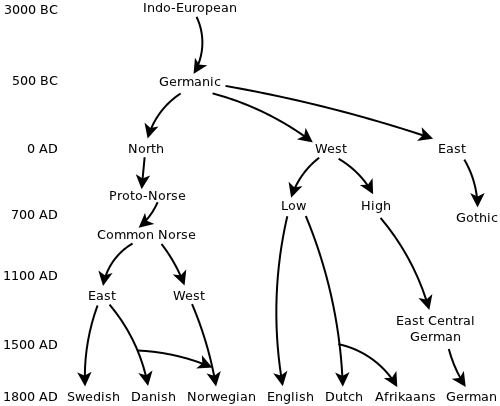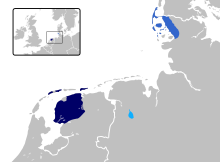What Language is Closest to English? May 17, 2016
Author: Beach Combing | in : Ancient, Contemporary, Medieval , trackback
English is a Germanic language and its closest living relation should be one of the Continental Germanic tongues, German, Dutch and the like. However, try speaking English to a German who knows no English, or try understanding German (with just English) and you will find that they are very distant relations. An Italian listening to Spanish: or a German listening to Dutch will have the strange sensation of understanding a language that is not their own. A Swede and a Norwegian, say, can communicate, certainly about basic matters, both using their own tongues. This is simply not possible for an English-speaker save perhaps with English dialect speakers, few of whom now survive and all of whom know English; or some of the world’s many colourful and bizarre pidgin Englishes.
Why is it that English and its close cousins, German, Dutch and the various German dialects drifted apart so radically? Well, first, English belonged to a western branch of the Germanic family, the ‘Ingvaeonics’, that evolved apart from the Germanic mainstream. Second, English encountered, in Britain, other languages, British Celtic (Brittonic) and most importantly, French and Norse (a distant Germanic relation) which influenced its vocabulary and syntax. Then, third, for reasons that have never been properly explained, English mutated away not just from the Germanic but from almost all Indo-European languages by abandoning an inflectional system with its verbs: crudely speaking English has the same verb ending in most situations.
So what is the closest relation to English? Well, despite English’s dramatic drift over the centuries, the answer to that question must be one of its continental Germanic cousins. After that it is a question of measuring. English is, for example, closer to Dutch than it is to German: reading Dutch is certainly easier than reading German for an English-speaker. However, English is even closer to Frisian, itself a cousin of Dutch, spoken in the north of the Netherlands (and in parts of Germany).

‘Even closer’ has to be parsed though: an English and a Frisian speaker will not have that happy experience, familiar to, say, a Galician and a Portuguese speaker of being able to communicate each in their own language; though they will have flashes of comprehension if they have the patience to keep up a conversation for more than the first embarrassing sixty seconds. Frisian could be English minus the island experiences of the last fifteen hundred years (Normans, Welsh and Vikings): in fact, Frisian is often said to be ‘modern’ Old English; though, note, it is nowhere near as close to Anglo-Saxon as Norse is to Icelandic.
For any English speakers itching to take on Frisian here is a national poem from the late nineteenth century. What does it mean? The English translation follows immediately on. Lots is comprehensible but there is no question that English and Frisian are three times removed.
Frysk bloed tsjoch op! Wol noris brûze en siede,
en bûnzje troch ús ieren om!
Flean op! Wy sjonge it bêste lân fan d’ierde,
it Fryske lân fol eare en rom.
Klink dan en daverje fier yn it rûn,
Dyn âlde eare, o Fryske grûn!
Here it is sung, just in case orthography gets in the way.
(Frisian blood, thicken up! Now rise, foam and seethe, and thud on through our veins! Rise up! We sing of the best land on the Earth, the Frisian land full of honour and glory. Sound then and thunder it far and wide, Thine old honour, oh Frisian ground!)
20 May 2015: Louis gives us science: As a Dutch speaker, I am always very glad of my knowledge of English, whenever I am reading (not hearing, mind!) Frisian. Together with my German and Dutch knowledge I am usually able to decipher about 90 percent of a Frisian text. With just German and Dutch, that would sink to less then sixty….
Michel sends this entertaining video in.
KMH, meanwhile, has this question: We know that strange things may happen biologically on islands cut off from the mainland – Australia is a good example of an entire continent in this category. Perhaps human languages ‘evolve’ in the same manner and this is why English has become so distinctive among the Indo-European group. What do you think?


